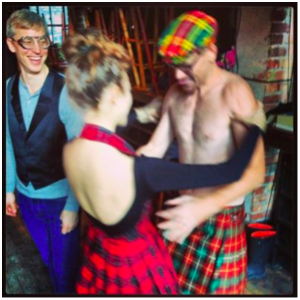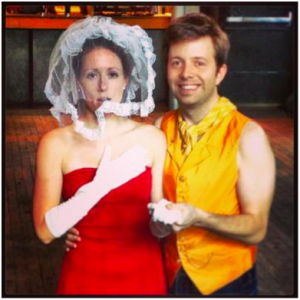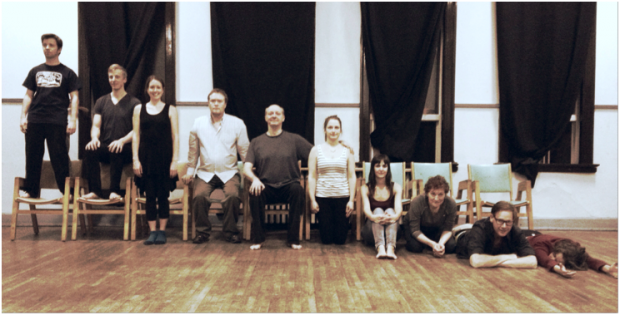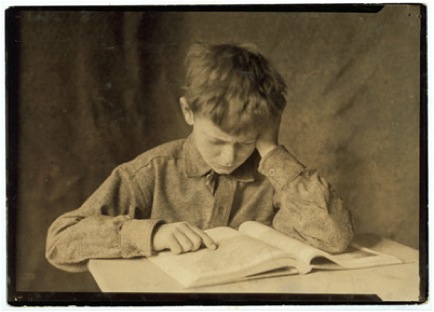
Guest post by Leora Morris
The first time I read Gilbert’s Engaged (a wordy Victorian farce that inspired other wordy playwrights like George Bernard Shaw and Oscar Wilde), it seemed like its success and artistic power hinged entirely on how it used language to throw into question our rituals around courting, marriage, and money. The second time I read it, I thought “I wonder if we could tell this story without speaking”. And so, in our silent-film style version (which threatens to end happily several times) we’ve replaced words with a live (original) piano score, a distinct physical language, and title card slides.
 Ten lines you won’t hear in our silent-film version of Engaged
Ten lines you won’t hear in our silent-film version of Engaged
The Scots:
“Dinna heed the water in my ee—it will come when I‘m ower glad”
“A gude girl loves her husband wi’ one love and her mither wi’ anither.”
“My hairt is sair at losing my only bairn; but I’m nae fasht wi’ ee.”
The Ladies:
“I love you madly, passionately; I care to live but in your heart, I breathe but for your love; yet, before I actually consent to take the irrevocable step that will place me on the pinnacle of my fondest hopes, you must give me some definite idea of your pecuniary position.”
“Lor, sir, kissing’s nothing; everybody does that.”
“I have come to the conclusion that it my duty to fall in with Cheviot’s views in everything before marriage, and Cheviot’s duty to fall into my views in everything after marriage.”
The Men:
 “I will think out some cunning scheme to lure her into marriage unawares”
“I will think out some cunning scheme to lure her into marriage unawares”
“Who is the unsightly scoundrel with whom you have flown—the unpleasant-looking scamp whom you have dared to prefer to me?”
“Why is it that when I love a girl I can think of no other girl but that girl, whereas, when a girl loves me she seems to entertain the same degree of affection for mankind at large?”
“If you would be truly happy in the married state, be sure you have your own way in everything”
10 Things You Might Be Strangely Reminded of in Engaged

1) That moment in TETRIS when the bricks start piling up
2) Today’s Special
3) The Hamburgler
4) Mary Poppins
5) Grade 7 school dances
6) Richy Rich comic books
7) PSY
8) The Importance of Being Earnest
9) The sounds of Super Mario Bros
10) Criminal line-up
Theatre Hetaerae’s Engaged is part of the 34th Annual Rhubarb Festival at Buddies and Bad Times Theatre. Shows are 8pm nightly from Wednesday February 20th to Sunday February 24th. For tickets: Box Office (416-975-8555) or go to tickets.buddiesinbadtimes.com
Directed by Leora Morris
Created and performed by Hume Baugh, Miranda Calderon, David Christo, Colin Doyle, Caitlin Driscoll, Alex Fallis, Sochi Fried, Eleanor Hewlings, Viv Moore, and Andy Trithardt
With Original live music by Scott Christian
and Costumes by Nina Okens


by Leora Morris
Part I: Theatre School Up Ahead, No Thinking Allowed.
When I graduated from theatre school, I knew how to crash a general audition, how to write a grant proposal, how to apply for internships on workinculture, how to analyze Shakespeare… I even knew something about how to create my own work.
I had a whole lot of skills ready to put into practice and very few ideas about what I would use them for. In fact, I didn’t even have a way to approach thinking about how I might want to use these newfound skills (outside of getting hired by someone else with a vision). No one ever sat me down and got me thinking about what type of theatre I might want to make and why. The more I look around at artists emerging from institutions like the one I attended, the more I feel we as a generation of artists were never asked to think about this.
It seems that conservatory programs value doing over reading and talking. I wonder: isn’t there a time and a place for thinking as well? Isn’t it a problem that my only non-studio classes were “The Business of Acting” (addressing questions around producing, funding, taxes, and marketing) and an undervalued set of Theatre History classes, taught by a fantastically overqualified instructor who barely had time to bring us up to Fronteras Americanas before he ran out of time? There was certainly very little space for discussions around aesthetics, contemporary Canadian and international theatre, cross-disciplinary work, and criticism.
Scott Walters explains that his desire to examine ideas motivated him to move from the professional world to academics: “Most theatre artists don’t have the time, energy, or inclination to graze in all kinds of books, and write, and ponder. They’re just trying to keep their heads above water!” He suggests the academic world could cultivate radical ideas and then disseminate them to the professional artistic community in digestible chunks via the internet.
I would rather imagine a way for artists to be both fully involved in their creative practices and still engaged in thinking about it at an “idea” level. Shouldn’t it be part of every performer’s development to consider the how and why of his or her artistic practices?
Part 2: Why the Internet Can’t Do It All.
If theatre schools aren’t going to start this discussion around artistic practice, it is lucky for an emerging type like me that the internet can provide some help. I can start to get a feel for the art being made, why it’s being made that way, what other people think about it, what I think of it, I can engage in discussion with more established artists, and so on. What this means, though, is that if I spend time considering my own practice, I generally don’t do it in a group, but alone with a coffee, maybe a notebook, likely my laptop. I get to physically come together with other artists to actually create, but a shared space to think critically is mostly limited to the internet. Is this kind of contact sufficient? Is there not a difference in the nature of the exchange when our ideas co-exist in live-space instead of in cyberspace? I find that something magical happens in that terrifying moment of trying to find my thought in front of a group of people. Those moments seem to transform my thinking in a different way than when I read someone’s blog.
This is not to say the internet can’t be a central player in discussions around practice, just that comments like this on the Next Stage blog start to worry me: “We’re not snobby, we’re just busy. And we’d all like to meet regularly to socialize and network, but who has the time?”
It makes me nervous when we start to discuss expanding and evolving our theatre community in terms of efficiency and time-management. What I appreciate about study group is that we are not interested in finding economic solutions. Instead, we prioritize finding the time and space to sit with the questions, so we can give them room to breathe. It might look unproductive, sound winding, feel clumsy – but the overall movement forward has a depth and breadth to it, that I’m not convinced is there when we aspire towards thinking with efficiency, or in isolation. Indeed, it is generally when I find myself staring at the wall, patiently allowing for new thoughts among new people, that I find they actually begin to bubble and rise.
Part III: Where Thinking Out Loud Fits In.
At Dancemakers, we structure our practice with the values of “3C’s” (contemporary, collaborative, and cross-disciplinary) and yet, we spend a lot of time trying to figure out what those words mean. Thinking Out Loud comes out of a simple desire to let our brains and bodies physically share a space while we all contemplate our practices. We are a small, generous, fluctuating group of dancers, actors, directors, academics, producers, artistic directors, and anyone else interested in filling the gap in the performance world between theory and practice (we often talk about dance but are interested in a broader discussion about the performing arts). We read texts and discuss them in order to identify our opinions, test our theories, refine our arguments, and contemplate new ideas.
A sampling of the questions tossed around:
- How do we respond to our artistic lineage?
- If we had postmodernism, why do I need to think about modernism?
- How do I dedicate myself to thinking critically and artistically about my world and still participate in it?
- Is it valuable to impose old work on new performers?
- Is amateur participation in the arts making professional art redundant?
For me, it’s an act of stretching myself into unfamiliar territory around people who relate to the same basic structures that I do, so I can think daringly without feeling alone at sea. It’s about conjuring the kind of curiosity and imagination that can lead to entirely new ways of working. I always leave feeling “activated”. For months the ideas and questions raised sit poised at the front of my mind, ready when I see a show and wonder “what is this show doing – and how do I feel about it?” or “how does this show fit into the arts ecology of Toronto/Canada/the world?”
We meet next Tuesday February 2nd and welcome new faces. We’ll be talking about audience as community and beauty (among other things). You can read the details of all our past and future goings-on here.
 Ten lines you won’t hear in our silent-film version of Engaged
Ten lines you won’t hear in our silent-film version of Engaged “I will think out some cunning scheme to lure her into marriage unawares”
“I will think out some cunning scheme to lure her into marriage unawares”





Recent Comments